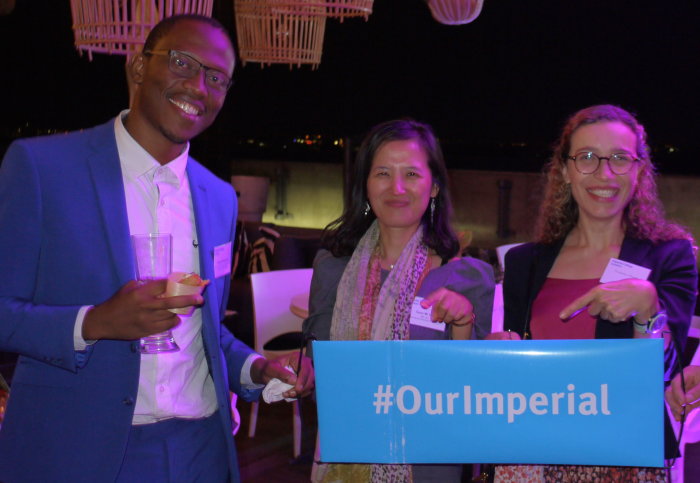Alumni celebrate Imperial’s growing ties with South Africa

South African alumni gathered in Cape Town and Johannesburg to hear how Imperial is strengthening its ties with the country.
Nearly 100 alumni met with President Alice Gast and other Imperial academics to share their post-study experiences and discuss Imperial’s growing partnerships in South Africa.
Speaking to the gathered alumni, President Gast highlighted some of Imperial’s major research projects in the region, including the new MIT Africa Imperial seed fund – which involves three institutions in South Africa.
President Gast said: “We are trying to look at our many collaborations and partnerships and think how we could work better in Africa.”
President Gast also spoke about internationalism – the theme of this year’s President’s address – and the need for international mobility.
Also speaking at the event in Cape Town was Dr Maddalena Cerrone, from Imperial’s Department of Medicine, who talked about her work at the Wellcome Centre for Infectious Diseases Research in Africa at the University of Cape Town (UCT) supporting numerous clinical trials in the field of HIV and tuberculosis (TB), in particular those centred on research and clinical facilities in the Khayelitsha township.
Professor Jan Cilliers, Chair in Mineral Processing at Imperial's Department of Earth Science & Engineering, spoke at the event in Johannesburg.
Professor Cilliers said: "It was so exciting to meet with our alumni and to hear what they have achieved. I was very pleased to tell them about our lunar mining research - I don’t think any of them thought that’s what they were going to hear about."
South African alumni

Imperial has a growing alumni network in South Africa. Academic Dr Michael Inggs (Electrical Engineering 1977) and his son, Gordon Inggs (PhD 2016, Electrical Engineering), joined the event in Cape Town.
Michael said: “Imperial launched me into quite a career, working in the UK, the States, before coming back to South Africa to work on a space programme. I am now a visiting professor at UCT.
"One thing I appreciated about Imperial is that, despite my coming from a Maths and Physics background, they were happy for me to join Electrical Engineering without engineering experience – other universities were not so flexible.”
CEO of GoBeauty, a global online listings company, Tatjana Mihajlov (Mathematics with Management 1996) said: “My first job after Imperial was as a business analyst, and within a month I was flying on a corporate jet. Studying Maths at Imperial gave me a structured approach to problem solving and helped me in launching and developing my business.”

Professor Mapundi Banda (Msc Computing 1991), who attended the event in Johannesburg, is now teaching mathematics and applied mathematics at the University of Pretoria.
Professor Banda said: “Numerical analysis was part of my course at Imperial and this enabled me to do a Masters in Industrial Mathematics at the Technical University of Kaiserslautern in Germany.
"I like to talk to students when they call me from Imperial and enjoy hearing about College news”.

Other notable Imperial alumni in South Africa include Dr Sibusiso Sibisi (Physics 1978), who is the Director and Head of the Wits Business School (WBS), Dr Makobetsa Khati (MSc Molecular Medicine 1998), the Executive Director of the National Research Foundation of South Africa, James Campbell (Geology 1985) is Managing Director of Botswana Diamonds and Ghanaian national Sir Sam Jonah (MSc Resources Engineering 1979) the Executive Chairman of Jonah Capital.
First African seed fund
The first Imperial-MIT seed fund to focus on Africa has awarded funding to three projects in South Africa, including a collaboration with the University of Cape Town on understanding how tuberculosis is spread; a project with the University of Pretoria investigating eco-friendly refrigerants; and a project with the University of the Witwatersrand that aims to improve our understanding of high energy physics, particularly the area of string theory.
South Africa is Imperial’s biggest African collaborator – publishing more than 200 joint research papers ever year.
Imperial and South African scientists are researching how smartphones could help diagnose infectious diseases in sub-Saharan Africa.
A review published in Nature, outlined how smartphones could help people to test themselves and receive results and support in their own homes.
Many smartphones have built-in sensors that could aid diagnosis, such as a heart rate monitor and an oximeter.
Article text (excluding photos or graphics) © Imperial College London.
Photos and graphics subject to third party copyright used with permission or © Imperial College London.
Reporter
Stephen Johns
Communications Division